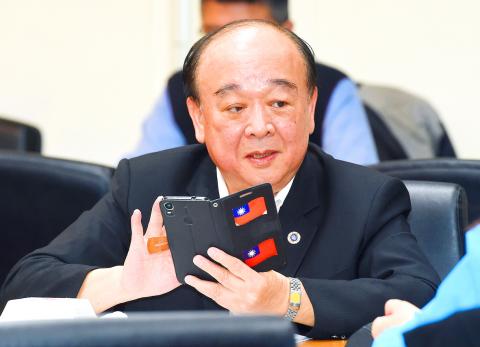Several lawmakers yesterday expressed concerns about Chinese Nationalist Party (KMT) Legislator Wu Sz-huai (吳斯懷) requesting information from the Ministry of National Defense for information — which reportedly included highly classified materials on military units.
Wu, a retired lieutenant general, previously sparked controversy when he reportedly attended an event in China commemorating the 150th birthday of Sun Yat-sen (孫逸仙) in 2016, when he sat through a speech by Chinese President Xi Jinping (習近平) and stood for a rendition of the Chinese national anthem.
The ministry on Thursday confirmed that Wu had requested information, with local media quoting a ranking officer as saying that the requests included materials on cyberdefense units at the new Information and Electronic Warfare Command and troop deployments for all three major branches of the armed forces, as well as updates on combined service units and military operations plans.

Photo: Liao Chen-huei, Taipei Times
Democratic Progressive Party (DPP) Legislator Wang Ting-yu (王定宇), who serves on the Legislative Yuan’s Foreign Affairs and National Defense Committee, said that while Wu is a retired officer, he sits on the legislature’s Social Welfare and Environmental Hygiene Committee, so he should focus on the tasks and issues concerning that panel.
“In addition to requesting information on cyberdefense units, Wu also inquired about the indigenous submarine development program. His actions are worrying and his motives are certainly questionable,” Wang said on Facebook yesterday.
The pro-independence Taiwan Statebuilding Party issued a statement condemning Wu.
“With the global Wuhan virus outbreak, China has stepped up its misinformation campaign, but Wu has not said a word. Now he wants to access classified information on Taiwan’s cyberwarfare units. We have to ask, is Wu collaborating with China from inside the legislature?” the party said.
While Wu’s requests are within the authority of a legislator, the doubts of the Taiwanese public must first be cleared up, Taiwan Statebuilding Party Legislator Chen Po-wei (陳柏惟) said, asking Wu: “Which side are you on? For whom do you fight?”
“Taiwanese know who we are fighting … that the enemy is China,” he added.
However, several KMT members defended Wu, saying that requesting information from government agencies is within the scope and authority of legislators.
As veteran, it is reasonable for him to request white papers and other reports from the ministry, Wu said, adding that contrary to media reports, he only requested public information, not “classified military materials.”
In a short statement, the ministry said that it had provided Wu with publicly available information, adding that lawmakers are authorized to make such requests in accordance with the legislature’s oversight role.
Additional reporting by CNA

US President Donald Trump yesterday announced sweeping "reciprocal tariffs" on US trading partners, including a 32 percent tax on goods from Taiwan that is set to take effect on Wednesday. At a Rose Garden event, Trump declared a 10 percent baseline tax on imports from all countries, with the White House saying it would take effect on Saturday. Countries with larger trade surpluses with the US would face higher duties beginning on Wednesday, including Taiwan (32 percent), China (34 percent), Japan (24 percent), South Korea (25 percent), Vietnam (46 percent) and Thailand (36 percent). Canada and Mexico, the two largest US trading

AIR SUPPORT: The Ministry of National Defense thanked the US for the delivery, adding that it was an indicator of the White House’s commitment to the Taiwan Relations Act Deputy Minister of National Defense Po Horng-huei (柏鴻輝) and Representative to the US Alexander Yui on Friday attended a delivery ceremony for the first of Taiwan’s long-awaited 66 F-16C/D Block 70 jets at a Lockheed Martin Corp factory in Greenville, South Carolina. “We are so proud to be the global home of the F-16 and to support Taiwan’s air defense capabilities,” US Representative William Timmons wrote on X, alongside a photograph of Taiwanese and US officials at the event. The F-16C/D Block 70 jets Taiwan ordered have the same capabilities as aircraft that had been upgraded to F-16Vs. The batch of Lockheed Martin

GRIDLOCK: The National Fire Agency’s Special Search and Rescue team is on standby to travel to the countries to help out with the rescue effort A powerful earthquake rocked Myanmar and neighboring Thailand yesterday, killing at least three people in Bangkok and burying dozens when a high-rise building under construction collapsed. Footage shared on social media from Myanmar’s second-largest city showed widespread destruction, raising fears that many were trapped under the rubble or killed. The magnitude 7.7 earthquake, with an epicenter near Mandalay in Myanmar, struck at midday and was followed by a strong magnitude 6.4 aftershock. The extent of death, injury and destruction — especially in Myanmar, which is embroiled in a civil war and where information is tightly controlled at the best of times —

China's military today said it began joint army, navy and rocket force exercises around Taiwan to "serve as a stern warning and powerful deterrent against Taiwanese independence," calling President William Lai (賴清德) a "parasite." The exercises come after Lai called Beijing a "foreign hostile force" last month. More than 10 Chinese military ships approached close to Taiwan's 24 nautical mile (44.4km) contiguous zone this morning and Taiwan sent its own warships to respond, two senior Taiwanese officials said. Taiwan has not yet detected any live fire by the Chinese military so far, one of the officials said. The drills took place after US Secretary